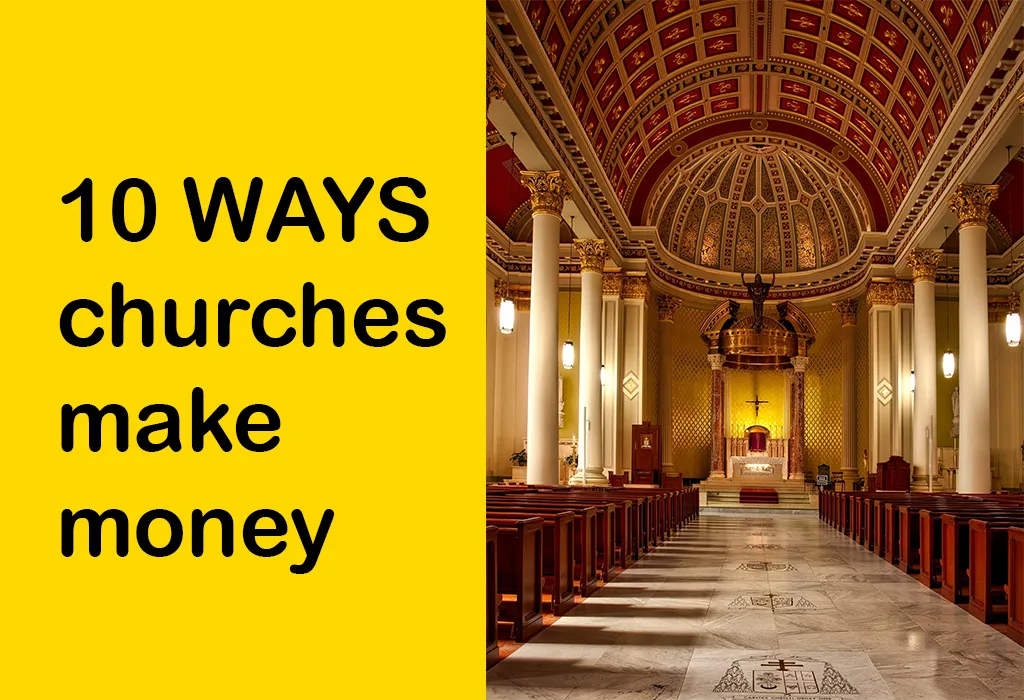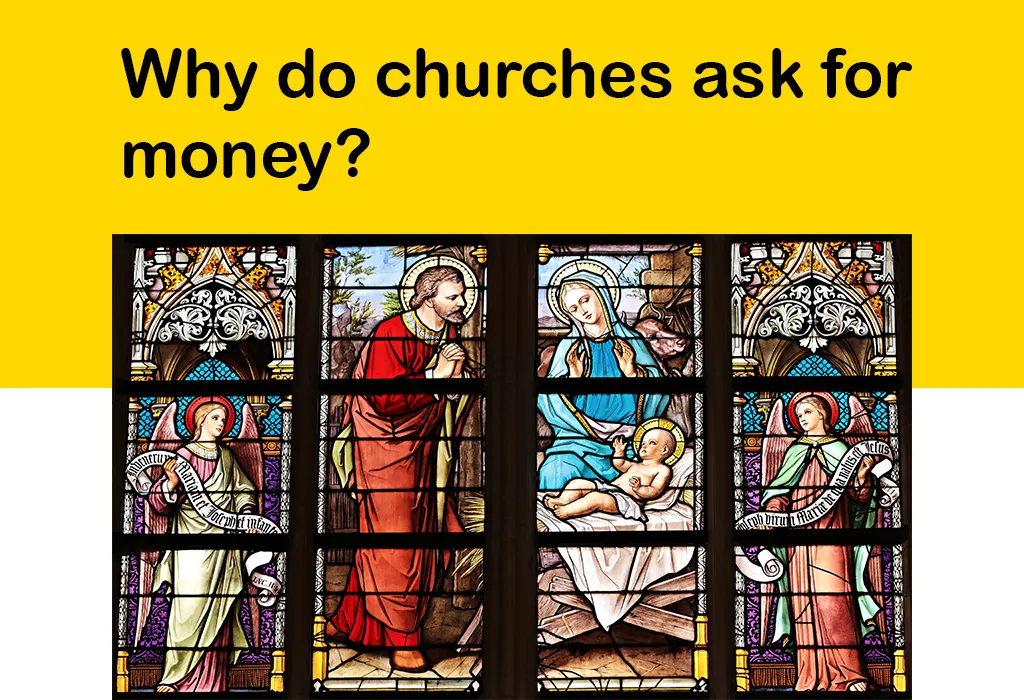The church is a place for Christian worship for believers. Over the years, the popularity of churches has increased significantly, resulting in a rising number of mega-churches throughout the United States and across the globe, resulting in the most prominent employees, with millions of them.
Even being, by definition, they are non-profit organizations, not businesses. They bring millions of dollars in profits. Churches take in and spend money for other things like covering program costs, maintenance, utilities, rent, and for ministers or pastors serving.
Usually, churches make money from traditional collection plates by donation. Churches also get money from investments, Tithing, sponsorships, Services, products, etc. Sometimes churches will have fundraisers of one sort—Bake sales, craft sales, etc.
Rarely but sometimes, churches will have some special event and charge admission.
Since being a self financial responsible system that generates considerable revenue for churches. It tries to improve most pathways and become a more liable system. Below are some high-paying ways through which churches are making money and funding their activities –
- Tithe and Offerings
- Crowdfunding
- Online Giving
- Text-to-Give campaign
- Auction (silent & charity)
- T-shirt fundraising
- Property renting
- Hosting Talent show
- Religious Events and show
- Start of for-profit Companies

1. Tithe and Offerings
Tithe and Offerings from their members are the primary forms of income or funding for churches. It is the traditional and standard mechanism for providing church services.
Usually, these are missionary collections run by every tier of churches, from national to local groups.
According to the Bible, To give a tithe is to provide a tenth of their income to God, while offering a sacrifice is voluntary.
2. Crowdfunding
Church crowdfunding is one of the best and easiest ways a community can raise funds for the survival of churches.
Usually, money raised through crowdfunding for various church activities like missionary trips, community support, construction or renovation, youth group activities, special programs, and events has a huge benefit.
3. Online donation
Donating online has become a powerful way for churches to raise funds from their kind parishioners and other donors through easy-to-use church fundraising,
which has become popular nowadays because of advanced technology and the COVID-19 situation.
Moreover, Churches can use an online application that can extend their community worldwide, which results in the regular church giving weekly tithes and offers. In addition, that digital platform also allows churches to post offers, new events, and other announcements so that community members can access them.
4. Text-To-Give Campaign
Text-To-Give is becoming a more popular and convenient donation idea for churches and religious organizations in the US. It works on the idea that many people forget to bring cash to church but not their cell phones.
As the era is becoming more digital, this method is making sense. Also, with this software, churches can conveniently collect donations from multiple locations.
5.Auction(Silent & charity)
Auctions are a great way to raise funds for churches’ fun and energy.
Auctions include silent and charity.
In silent auctions, they give their community members a little extra time while their members bid on unique and engaging items. Churches should ask local businesses and individuals if they want to donate items to silent auctions. Some everyday items include restaurant gift cards, signed memorabilia, lessons with a professional, gift baskets, and more.
Churches can take advantage of a mobile bidding tool to give their participants a technically enhanced bidding experience and gain the potential to raise big bucks.
In charity auctions, churches raise money with personal interaction with their parishioners. Church asks about charity items from local businesses and tries to donate as many items as possible for next to nothing. Churches hire auctioneers, send out invitations and provide food and drinks. Churches should make sure everyone knows the rules of charity auctions beforehand. People will go away with some unique items and experiences, and churches can raise more money and have opportunities to build solid business relationships in the future.
6. T-shirt fundraising
Selling T-shirts is a classic charitable strategy for every age group. Special thanks to online t-shirt fundraisers for making this concept more accessible and profitable, which has become even more straightforward.
Churches can customize T-shirts with the most refined custom design and quality, and they can also highlight their church’s programs or mission. They can print God’s related quotes, inspirational quotes, or words from the Bible to attract existing customers.
That way, fundraising merchandise can fulfill the dual purpose of raising money and inspiring meaningful dialogues anytime churchgoers wear them.
7. Property renting
Churches can operate the same way as businesses as many churches rent their extra property.
Making money is a profitable alternative for generating funds for church activities. Depending on the property and condition, they can rent out in at least three ways: for events, business, and coworking space, which will generate income. With this additional income, the church can cover the entire monthly mortgage.
8. Hosting a Talent show
Organizing a talent show for the local community and raising funds for churches is one of the entertaining and convenient ways to generate extra money for churches. This event can be particularly effective and enjoyable for the children in the church youth group, and more people will be engaged in the church activities. They can charge a low entry fee and sell concessions to complement their fundraisers. They can also set up a general donation box in the event area.
9. Religious Events and shows
Churches are unique places to celebrate religious events, such as Christmas, Easter, etc. By organizing all these ceremonies every year, the church can gather some cash from people joining the events.
In addition to this, they also organize Sing-a-Thon, which is a musical concert that helps churches to raise money. They charge entry to the singing festivals and sell religious items throughout the event.
They host a Family Fun Day, an easy way to raise money for the church.
Set up games, food and drink stations, and a donation table, and send invitations to the community.
They host the Church movie night with a small entry fee and sell concessions during the movie to raise more cash.
10. Start Of For-Profit Companies
The church is tax-exempt because they are non-political, do a lot of charity, and is non-profit. Still, it is allowed to establish legally for-profit Companies as long as the profit organization pays
its share of taxes and the profits from the companies are returned in support of the church.
Church authorities need not fully understand how to establish and run a business. They need to partner with people in their communities with business experience.
Why do churches ask for money?

The church’s finances were initially designed for two primary purposes –
1. For basic human needs of the clergy
2. For support of the poor.
That is a great question: why are churches asking for money and telling us what to do with it.
At the basic level, there are three reasons why religion has a legitimate interest in how its adherents spend their hard-earned money –
1. Practical
The underground churches often ask for money to pay for pastors and staff to do ministry in their city. Churches need funds for individual church ministers such as children and students, facilities and maintenance, worship services, building construction, technology, debt reduction, and many other categories.
Churches do much more than open their doors on Sunday morning. For more than a thousand years, religious communities have been the leading providers of education, healthcare, and services to the vulnerable worldwide.
2. Pastoral
Pastoral or out of concern for one’s well-being and spiritual growth.
Jesus once said where your treasure is. There is your heart. In other words, money is such a powerful thing and of such earthly importance that how one decides to spend it tells us a lot about who they are on the inside, what’s truly important to them,
and where their Hope is anchored. Therefore, any person of faith serious about examining their deepest Hope and their core values and any leader in the faith who truly cares about their people’s maturity,
growth, and character must address what’s done with the money.
3. Philosophical
People who believe in God live under specific philosophical implications about their belongings; for example, if an all-creating, eternal God exists, all that we see belongs to him. It was made by his hand, it was here before we lived, and it will remain long after we’re gone. No one owns anything. We are momentary managers;
therefore, a person of faith will be drawn with their church and spiritual leader’s help to consider what it means to manage odds rightly. That’s why in Christian circles, we may take here stewardship. It’s all about aligning one’s possessions with the will of their rightful owner. , Also, the average Christian gives about 2% of their income to the local church each year.
How do churches spend their money?

According to a study, in 2017, US churches collectively received $124.52 billion in donations, which accounts for 29% of all charitable giving in the states.
When it comes to budget size, 28%of churches are working with a budget of $100,000 each year or less,
33% of churches have an annual budget between 100,000 and a quarter million,
17% of churches are in the quarter million to half million range, 13% in half million to 1 million range, and 9% with a yearly budget greater than$1 a million.
As for the median congregational revenue, that sits at $ 169,000.
So that’s what churches are working with regarding their budgets.
The most significant portion of their money goes to personnel is the salary and wages for the pastors and people who work for the church and run its ministry, which makes up 49% of the budget.
So about half of the personnel.
The second biggest line item in the budget is practical. 23% of the budget goes to that. It will comprise the rent or the mortgage along with the utility bills that accompany that facility, also building, maintenance, construction, technology, and other categories.
Altogether, about three-quarters of the church budget covers facilities and personnel.
The final 28% is where the categories become much smaller. We’ve got dues at around 6%, programming at 10%, and missions at 11%.
Now, dues are straightforward.
But for, the mission portion of the budget includes service projects and general benevolence.
It shows churches donate about 10% of their budget to efforts beyond their members and programs.
As for the programming budget, about 10% of the average church.
This program budget gets broken up within itself.
The most significant chunk is for worship at 35%, 23% for kids programming, 21% for events, 14% for adults, and 7% for others.
Do churches get government funding?
According to the US constitution, the Government has expressly forbidden to provide of financial Grants to support “inherently religious ” activities by faith-based organizations.
It means the church can’t use any part of a direct Federal grant to fund religious activities like worship, prayer, devotional Bible study, instruction, or Proselytization.
However, churches may be eligible for “money grants” when establishing certain social services.
Religious organizations that run hospitals, food banks, homeless shelters, clinics, Day care centers, and other services may be eligible. The church may use space to provide Federal-funded services, where there is no need to remove religious symbols.
These funds can also be used for objectives such as reducing crime, assisting victims of crime, keeping juveniles out of the life of crime, and mentoring youth and adults.
Churches should ensure that their inherently religious activities are separate from the Government-funded services it offers. Churches should receive Federal money in the form of “vouchers ” or “Indirect aid,”
which provides funds or certificates to individuals in need, which can be used to obtain services from several qualified organizations.
How do non-denominational churches make money?
Non-denominational Christianity consists of churches that are not self-affiliated with a traditional denomination and distance themselves from the confessional or realism of other Christian communities
that is “denomination “by not formally aligned with a specific Christian denomination.
These churches are commonly established by individual pastors or communities who simplify themselves ad “Christian “and “Disciples of Christ,” practicing a different approach to traditional Christian worship.
The non-denominational church has a less defined level of oversight or governance. In contrast, in denominational churches, this is more clear how the oversight of the church runs.
In non-denominational churches, voting rights are absent on issues and things that affect the church. Still, in the denominational church, there are voting rights.
In non-denominational churches, there is no transparency and information about where your donation went. Still, in denominational churches, there is a higher level of transparency.
Non-denominational churches may fund their missionaries from within their church solely from the tithe within their church. Still, in a denominational church, the tithe portions are the percentage of taxes that will go to those organizations.
So all the missionary work, either within the nation or internationally, can be pulled together with every other denominational church.
Churches make money from donations, tithing, and offerings, regardless of denomination.
Pastors work full-time outside the church to keep church expenses as low as possible.
They rely a lot on volunteers and do ministry as a team.
Non-denominational church service begins with people entering the church campus,
They take their kids to the children’s church and crowd into the small cafe to buy their designer coffees.
They bring people to the auditorium and play a series of popular contemporary Christian songs between the end of the song service, the Pastor stepping up to the podium, and the weekly offering is taken.
Some Pastors are very dynamic speakers, and some sermons will be in-depth studies on a particular portion of the Bible,
with the occasional return to their mainstays of tithing and church involvement.
To gain state sales, property, and income tax exemption, a church must meet specific criteria. The church board must consist of at least three people, none of whom are relatives.
Pastors have IRS regulations that allow some tax-free income (in the US) in terms f housing allowance and expense reimbursements.
Pastoral salary is fully taxed and subject to social security taxes.
Conclusion
Churches have always considered ways to expand their income streams to maintain church activities. Churches hugely depend on charitable donations, which are not fixed income,
so they need to explore alternative ways of income for future ups and downs and keep it sustained for future church activities.
Thanks a lot for your precious time on our blog please do tell us how you have enjoyed our blog and for any suggestions please!! the comment section is all your’s..
Keep the conversation going.

Hi, i’m Akash shaw creator of Adsvast agency , Hello, I am a perfectionist with deep love for aesthetics,
a graphics designer with expertise in logo design and branding.
My only goal with Notamartwork is try to help others to freelancers to get jobs and learn how to do freelancing.
